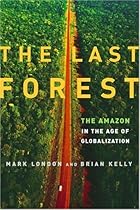 Head over to the New York Times Review of Books to find a nuanced (and critical) review by John Terborgh of the new book The Last Forest: The Amazon in the Age of Globalization - Here's a brief extract from the review to whet your appetite:
Head over to the New York Times Review of Books to find a nuanced (and critical) review by John Terborgh of the new book The Last Forest: The Amazon in the Age of Globalization - Here's a brief extract from the review to whet your appetite:
After five centuries of ignoring the north, powerful interests in the south have recently taken interest in the resources of the Amazon, precipitating a paroxysm of change in the north that will affect the entire world. Politics will guide the course of change but how, and for what reasons, remains uncertain, for internal and external forces are pulling in opposite directions. Internal forces, large corporations among them, overwhelmingly favor rapid development of the Amazon—expansion of the logging, mining, and agricultural frontiers. By contrast, those concerned with the world environment view the "loss" of the Amazon as an impending global tragedy. They want to find ways to sustain the vast forest, and with it, an unrivaled wealth of biological diversity, hundreds of indigenous tribes, and, of increasing importance, the vast store of carbon contained in the Amazon's trees.This is one of the key questions to be addressed at the forthcoming World Wilderness Congress, to be held in South America in 2009.
How will these tensions play out? What happens to the Amazon over the next two or three decades may prove decisive in the world's efforts to curb greenhouse gas emissions. If the Brazilian government continues to take a cautious approach to energy policy, as it has for several decades, and makes an effort to plan and control development in the Amazon, the area could serve as a model for the world's remaining regions of forest wilderness—among them the Congo basin, Siberia, northern Canada, and the outer islands of Indonesia. But if Brazil chooses to follow a business-as-usual policy—a laissez-faire, Wild West scramble for resources—it could push the South American continent, if not the world, over a climatic tipping point from which there would be no return, a prospect that should be of concern to everyone on the planet. - Full review and further John Terborgh articles.
Further South American/World Wilderness Congress reading:










No comments:
Post a Comment